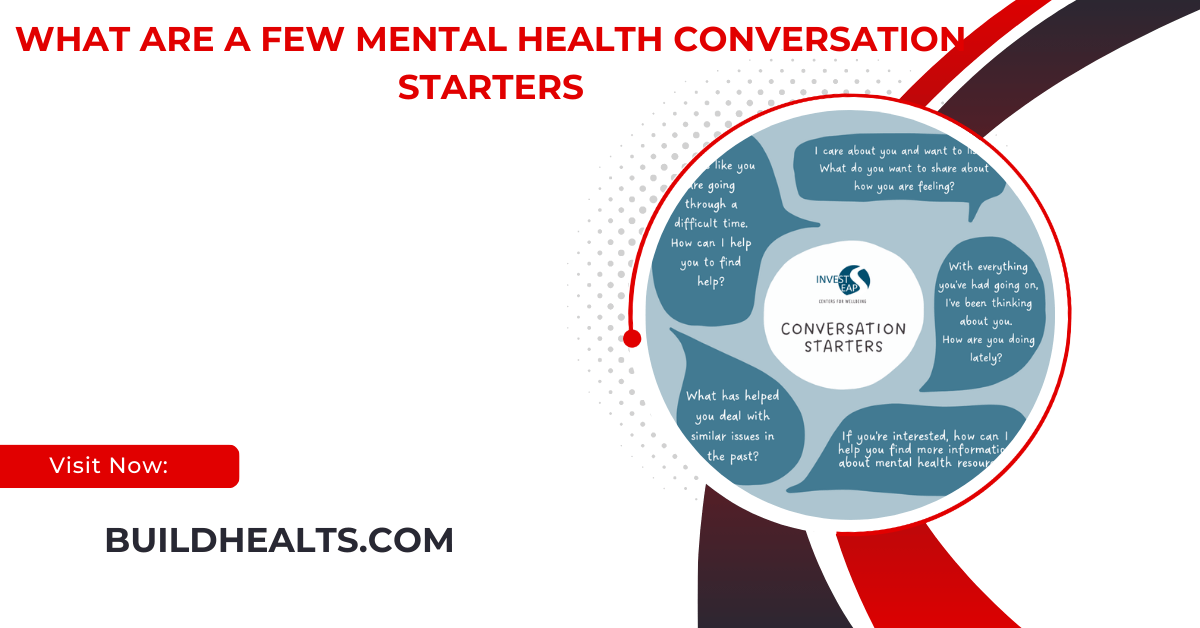Starting conversations about mental health reduces stigma and promotes understanding. Good conversation starters include asking about feelings and personal experiences.
Mental health is a crucial part of overall well-being, but discussing it can sometimes feel challenging. Many people want to talk about their feelings, experiences, and struggles but might not know how to initiate these conversations.
This article provides helpful mental health conversation starters that can ease the process and foster a supportive dialogue.
Why Start Conversations About Mental Health?

The Importance of Discussing Mental Health:
Engaging in conversations about mental health is essential for numerous reasons, including:
Reduces Stigma:
- Breaking Barriers: Open discussions can help break down the stigma surrounding mental health issues. When we normalize talking about mental health, we reduce the shame and fear that often accompany it. This creates a more accepting environment where individuals feel safe to share their experiences.
- Example: If someone feels comfortable sharing their mental health challenges, it encourages others to do the same, creating a ripple effect of openness.
Promotes Understanding:
- Empathy Development: Conversations about mental health can enhance understanding among individuals. By sharing stories and experiences, we foster empathy and compassion for those dealing with mental health issues.
- Example: Learning about someone’s struggle with anxiety can help others understand the impact it has on daily life and the importance of supportive interactions.
Encourages Help-Seeking:
- Breaking the Silence: When people see that their friends and family are willing to talk about mental health, they may feel more comfortable seeking help themselves. This can lead to early intervention and better mental health outcomes.
- Example: A friend might share their experience with therapy, which may encourage someone else to consider seeking professional help.
Also read: How Can Dissection Be Bad For Mental Health – A Deep Dive!
How to Approach the Topic:
Before starting a conversation about mental health, consider the following tips to ensure the dialogue is respectful and productive:
Choose the Right Setting:
- Privacy Matters: Find a comfortable and private space to talk. A quiet coffee shop or a serene park can provide a relaxed atmosphere conducive to open discussions.
- Example: Instead of bringing up mental health during a loud party, suggest a walk in the park where both parties can converse freely.
Be Genuine:
- Authenticity is Key: Show that you genuinely care about the other person’s feelings. Use empathetic language and express your willingness to listen.
- Example: Phrases like “I’ve noticed you seem a bit off lately, and I’m here if you want to talk” can convey your concern.
Listen Actively:
- Focus on Listening: Be prepared to listen without judgment. Sometimes, individuals may not want advice; they simply need a compassionate listener.
- Example: Nod, maintain eye contact, and respond with affirmations like “That sounds really tough” to show you are engaged.
Conversation Starters for Mental Health Discussions:

General Questions:
Starting with general questions can open the door for more profound discussions:
How have you been feeling lately?
This open-ended question invites the other person to share their emotions. It demonstrates that you genuinely care about their well-being.
- Example: If a friend seems withdrawn, asking this question may lead them to share their feelings of sadness or anxiety, allowing you to provide support.
Is there anything on your mind that you’d like to talk about?
This question encourages them to express any concerns they may have, creating a safe space for sharing.
- Example: This can lead to discussions about stress at work or personal challenges, allowing you to offer support or suggestions.
Also read: How Long Is The Health And Hospitals On Boarding Process – A Complete Guide!
What do you do to relax when you feel stressed?
Asking about their coping strategies can lead to a discussion about mental health practices and self-care.
- Example: They might share relaxation techniques like meditation, reading, or exercise, leading to a dialogue about the importance of self-care.
Questions About Personal Experiences:
These questions help deepen the conversation:
Have you ever faced a difficult time in your life? How did you get through it?
Sharing personal experiences can foster connection and understanding. It also shows that struggles are a normal part of life.
- Example: A person may recount their journey through a tough period, such as a loss or job change, which can lead to mutual sharing of life experiences.
What has been the most significant lesson you’ve learned about mental health?

This question invites reflection and can lead to insightful discussions about personal growth and awareness.
- Example: They might discuss the importance of vulnerability and how sharing struggles with others can be empowering.
How do you feel about talking to a professional if you ever need to?
This question opens up the topic of therapy and mental health professionals, helping normalize seeking professional help.
- Example: A positive discussion about therapy can help reduce anxiety about reaching out for professional support.
Building a Supportive Environment:
Creating a Safe Space:
When discussing mental health, it’s important to create a supportive environment:
Use Affirming Language:
- Validation is Crucial: Let the other person know that their feelings are valid. Phrases like “It’s okay to feel that way” can be very comforting and make them feel heard.
- Example: If they express feeling anxious about a situation, respond with “Many people feel that way; you’re not alone.”
Be Non-Judgmental:
- Embrace Openness: Avoid making assumptions or judgments about their feelings. Everyone’s experience is unique, and it’s important to respect that.
- Example: Instead of suggesting how they should feel, say, “I appreciate you sharing that with me.”
Encourage Open Communication:
- Foster Honesty: Let them know it’s okay to express their thoughts and feelings without fear of judgment. This encourages honesty in the conversation.
- Example: Reassure them that your discussion is confidential and that you’re there to support them.
Follow-Up Conversations:
After the initial discussion, following up shows your continued support:
Check-In Regularly:
- Stay Connected: Asking how they are doing later shows you care and helps maintain the conversation. It also signals that you’re a reliable support system.
- Example: A simple text saying, “Hey, I was thinking about our talk the other day. How are you feeling?” can mean a lot.
Be Available:
- Availability Matters: Let them know you are there to talk whenever they need it. Your availability can be reassuring and encourage them to reach out.
- Example: Mentioning that they can call or text anytime reinforces your support.
Also read: What Wfp Does For Environmental Health In Bangladesh – A Complete Guide!
Share Resources:
- Empower with Information: If appropriate, share helpful resources like articles, websites, or support groups that can provide additional support.
- Example: You might say, “I found this great article on mindfulness that might help you with stress management.”
FAQ’s
1. Why is it important to talk about mental health?
Talking about mental health reduces stigma, promotes understanding, and encourages individuals to seek help.
2. How can I create a supportive environment for mental health discussions?
Create a supportive environment by using affirming language, being non-judgmental, and encouraging open communication.
3. What should I do if someone opens up about their mental health?
Listen actively, validate their feelings, and offer your support without judgment.
4. How can I follow up after discussing mental health with someone?
Check in regularly by asking how they are doing and reassure them that you are available to talk whenever they need it.
Conclusion
In conclusion, initiating conversations about mental health is vital for reducing stigma and promoting empathy. By using thoughtful conversation starters and creating a safe environment, individuals can foster open discussions about feelings and experiences. Continued support and follow-up can further encourage individuals to seek help and maintain their mental well-being.




